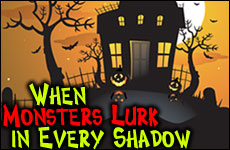 Identifying as a Jew
Identifying as a Jew


5 min read
Are you threatened by someone who has different beliefs than you?
Every year at Halloween, my wife and I lay in a supply of candy for the trick-or-treaters who come knocking at our door, even though neither we nor our children observe the rituals of the day. Only once did we fail in our preparations: that was the year we forgot to brief our four-year-old son on the creepy customs of this curious festival.
Shortly after dark, I watched from the window as the first of our nocturnal visitors arrived, alighting from a minivan that idled beside the curb and swiftly approaching our front door. The doorbell rang, and my son raced to answer it, excited only by the prospect of an unexpected visitor.
Imagine his surprise, upon throwing open the door, to find himself face to face with a 4-foot-high Frankenstein's monster complete with rubbery green skin, oozing stitches, and bolts protruding from its neck. Imagine further the surprise of our gruesome little guest when he stepped forward with his bag held open, only to receive a two handed shove in the chest and have the door slammed in his face by a ferocious four-year-old shrieking, "Monsters!"
Young Frankenstein took off toward his car at full flight, also screaming, "Monsters!"
We sorted the matter out and little Frankenstein got his Milk Duds, but it was a long time before my son was willing to answer the door again. That's a normal response, for a four-year-old. I have to wonder, however, if we aren't all spending far too much time peering out from behind our curtains and seeing monsters lurking in every shadow.
The simple minds of children sort out the dichotomy of their worlds in the most rudimentary fashion: us and them, superheroes and monsters, good guys and bad guys. And the good guys always wear white.
As we grow up, however, we should come to appreciate that the world is considerably more complex, that the good guys don't always look like us and the bad guys sometimes do. Unfortunately, by longing for the simplicity of childhood, many adults cling to an either/or view of the world as unsophisticated as a child's. And although childishness in children may be cute, in adults it is not only embarrassing, but dangerous.
The desire for a return to simplicity is easily understood. As technology and social evolution spin our world around faster and faster, people are seeking common belief, common culture, and common interest to steady them against the storm. Indeed, cultural continuity and a sense of community are among the most stabilizing factors within families and society. But when we begin to feel threatened in our own beliefs and insecure in our own cultures simply because others are expressing their beliefs and cultures in their own way, then culture becomes a battlefront across which enemies stand ready to attack.
The Talmud says, "Know how to answer a heretic."
One response to this kind of uneasiness is to become a universalist. "I'm okay, you're okay, and everyone else is okay, too." The only one not okay is the one who passes judgment on others. This is a comforting philosophy, which may explain its popularity. It also explains a report last year that teachers in high school and college failed to persuade a large percentage of their students to take a stand in condemnation of Hitler's Nazis: by refusing to concede that one ideology is better or worse than any other, the students eliminated the need of ever having to defend their own.
A second response calls for a good offense as the best defense. By attacking the shortcomings of others, I deflect attention away from my own. It doesn't take much imagination, either, since virtually every religion and culture has enough dirty laundry to provide any supermarket-aisle tabloid with a supply of juicy banner headlines. But all that soiled laundry, aired in the light of day, only feeds our mistrust and paranoia, without providing any direction toward cleaning up the messes that we have made ourselves.
The only reasoned response to cultural insecurity and, as such, the most difficult, is for all of us to study and learn about our respective cultures and ideologies well enough that we immunize ourselves against the xenophobia that results from ambivalence in our convictions. When I truly understanding my own identity, my heritage, and my beliefs, when I take responsibility for my faults and begin working to correct them, only then can I move toward confidently separating attitudes that are wrongheaded from those that merely differ from my own.
"Know how to answer a heretic," the Talmud says. You don't necessarily have to engage him in debate, but you do have to know, for your own peace of mind, why his beliefs differ from yours. Without such knowledge, we are helpless to discern what hides behind the masks all around us, helpless to recognize the difference between dangerous fanatics and simple neighbors, between real monsters and children whose only wish is that we add a little sweetness to their lives.
